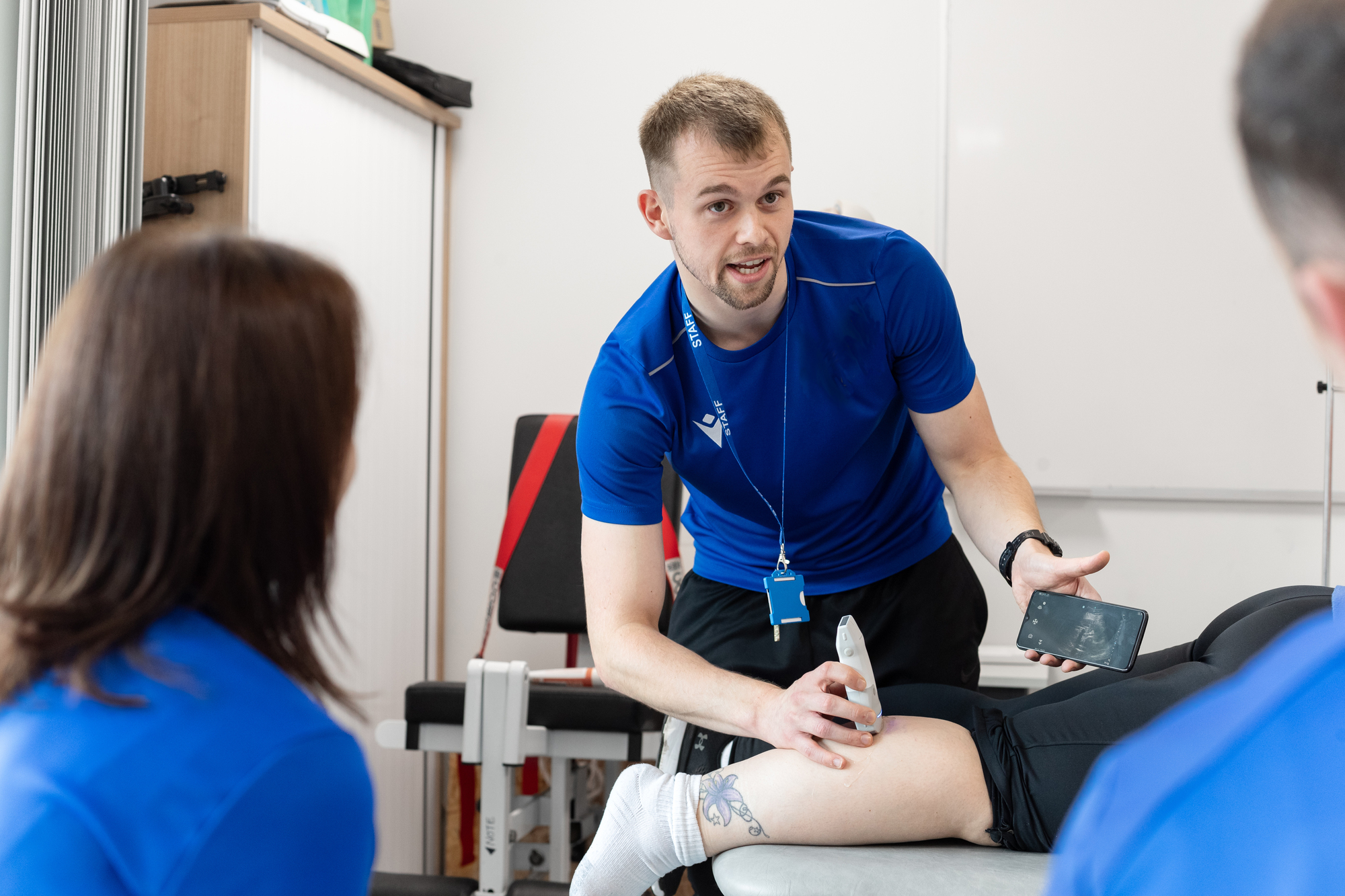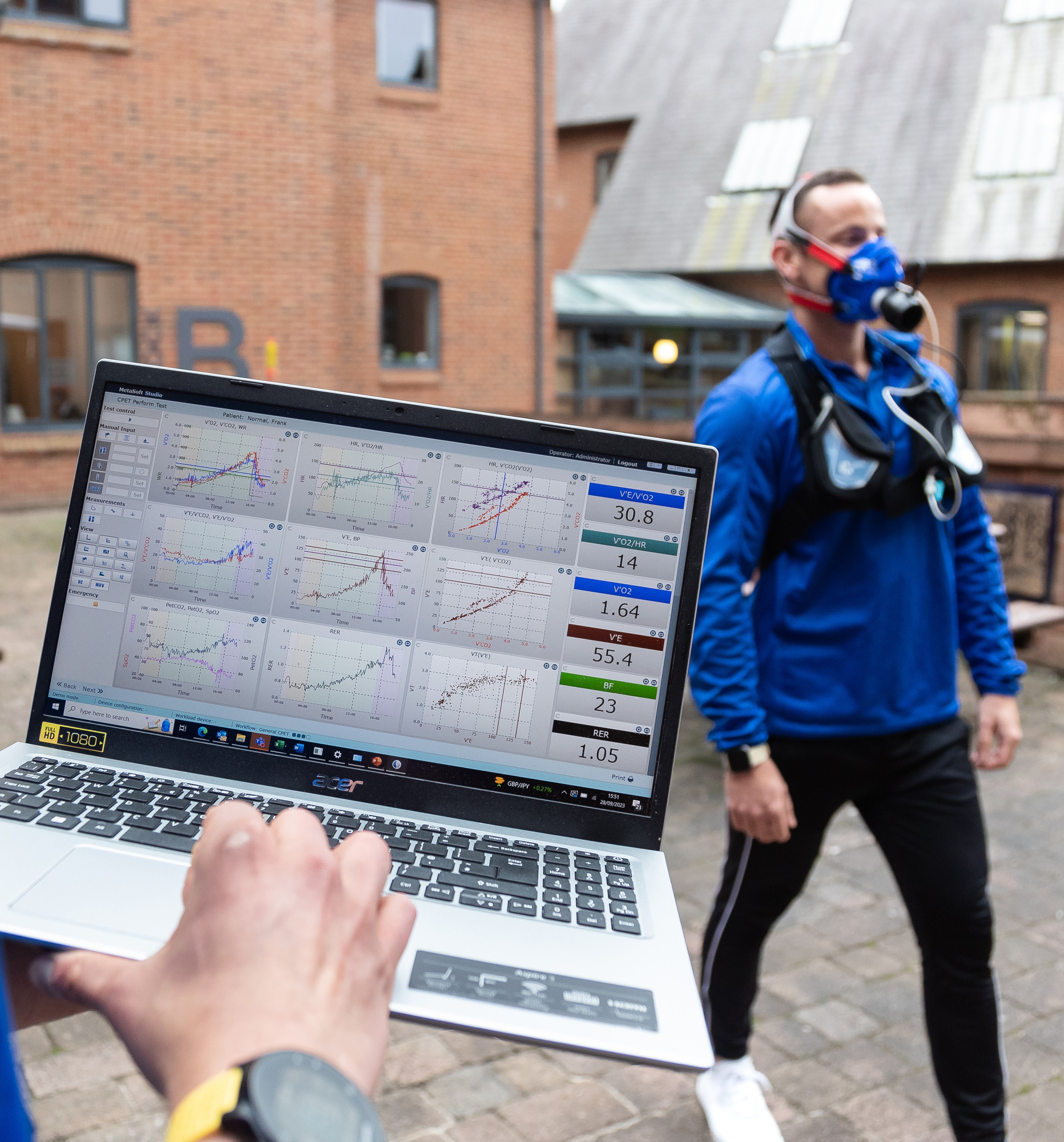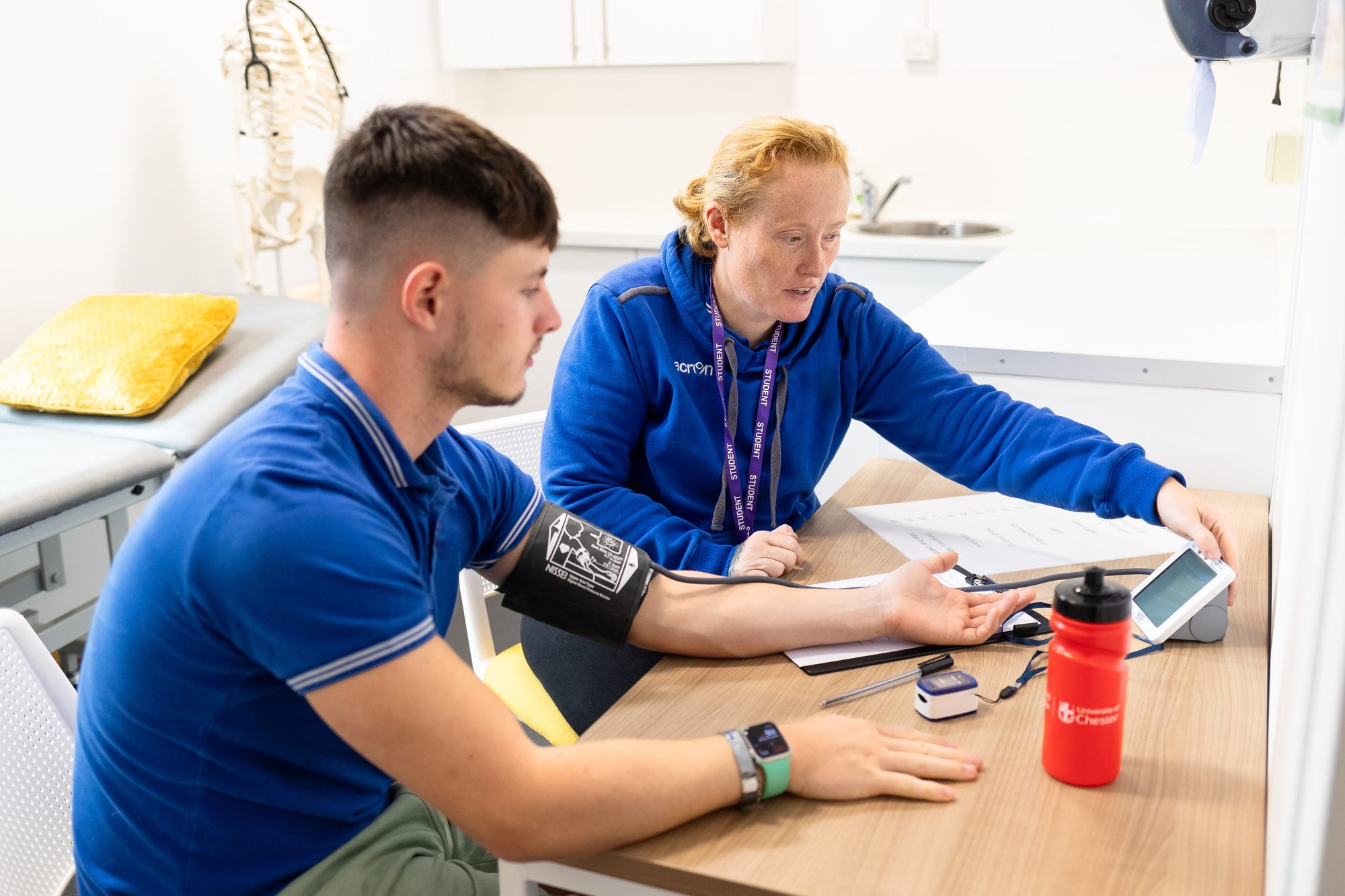Exercise Medicine MSc


Exercise has evolved into a global industry, with exercise scientists, advanced practitioners and researchers playing an increasingly crucial role in promoting wellbeing, preventing disease and prolonging the lives of those with life-limiting disease. Long-term health conditions such as cardiovascular, respiratory, metabolic, musculoskeletal and neurological diseases, as well as cancer, mental health, and frailty are becoming more prevalent worldwide. These diseases are further exacerbated by low levels of physical activity, a sedentary lifestyle and an ageing population. As a result, there are more employment opportunities in the health and exercise sector than ever before.
Whether you are a sport scientist, health and fitness professional, have a background in medicine or physical activity related discipline, come and take your learning to the next level. Develop the most up-to-date knowledge and skills essential for working with individuals and communities to improve their health and wellbeing.
On our degree, you will get the opportunity to become competent in screening participants, undertaking testing and prescribing exercise across a variety of different environments (gym, clinical, community, home-based and virtual environments) for specific long-term conditions and multi-morbidities. You will utilise critical thinking and scientific reasoning to design and tailor interventions for specific individuals or communities and employ the most appropriate behaviour change techniques to increase adherence. You will also get the opportunity to undertake an empirical piece of research in your specific area of interest.
Through practice, you will also develop and enhance key employability skills such as problem solving, resourcefulness, adaptability, accountability, critical thinking, administration, confidentiality, communication, teamwork, project management skills, creativity, independence, utilising technology, research and evaluation. On your journey, you will also improve your confidence, build self-belief, resilience, and improve self-awareness. You will learn the best ways to demonstrate these to an employer, which will help springboard your career to the next level within the health and exercise sector.
What You'll Study
On the MSc Exercise Medicine course you will study six core modules in 12 months, across four terms of 10 weeks. You will start by studying 40 credits in the first term and then you will study 40 credits in terms two and three alongside the 60-credit research project in Exercise Medicine module, where you will develop your research ideas. The final term will be devoted entirely to completing the research project.
- The Physical activity for long-term public health promotion module covers key concepts in physical activity and lifestyle, emphasising their role in preventing long-term health conditions.
- The Advanced epidemiology, pathophysiology and clinical assessment module will explore the epidemiology, pathophysiology, and pathogenesis of a wide range of long-term health conditions, such as cardiometabolic diseases, cancer, frailty, and mental health challenges.
- The Applied exercise prescription for long-term health conditions module is designed to equip you with the knowledge and practical skills required to safely and effectively prescribe exercise for individuals with various long-term health conditions.
- The Research methods in sport and exercise module will equip you with essential research skills in sports and exercise medicine and science.
- The Research project in exercise medicine module offers you the chance to work closely with an expert member of staff from the course team, to support the development and execution of your research project.
All these modules are designed to prepare you for the real-world tasks you will encounter in professional and research settings and are brought together in the Professional practice in exercise medicine module, which is designed to increase your awareness of the diverse career opportunities within exercise medicine and allied health sectors, to help you navigate through the processes involved in gaining meaningful employment and progressing within the sector globally. You will explore job market trends, gain an understanding of industry expectations, and identify pathways for certification and specialisation.
The information listed in this section is an overview of the academic content of the course that will take the form of either core or option modules and should be used as a guide. We review the content of our courses regularly, making changes where necessary to improve your experience and graduate prospects. If during a review process, course content is significantly changed, we will contact you to notify you of these changes if you receive an offer from us.

How we teach at the University of Chester
The course will be delivered across four terms of ten weeks. You will be on campus approximately three days per week, and the timetable will remain fixed, allowing you to organise your life around your studies. You will study 40 credits in Terms 1 to 3, alongside the 60-credit 'Research Project in Exercise Medicine' module (Terms 2 and 3), which will become the sole focus in Term 4.
The Exercise Medicine course is delivered in person, with scheduled contact hours of about eight to ten hours per week. You should also plan to dedicate at least ten to 15 hours per week to independent study, which may include self-directed study, practical skill development, reviewing course material, research, tutorials, library use, peer collaboration, and assessment preparation.
Experienced academics and practitioners teach the course using various methods, including lectures, seminars, practicals (laboratory and gym-based), and workshops. You'll engage in active learning with peers through case studies, scenario-based learning, and interactive group work promoting deeper learning, critical thinking, and employment readiness.
This course prepares you for real-world tasks in professional and research settings. You can tailor your assessment mode in some modules. Engaging assessments challenge you to produce high-quality work, encouraging collaboration, expanding digital capabilities, and demonstrating practical delivery skills. Assessment types include competency/scenario-based practicals, MCQs, presentations, essays, and research papers. A portfolio will track your progress, and you will complete an assessed job application. Formative assessment will improve your work before submission, with timely feedback to reflect on previous work and improve future assessments.
The course design has incorporated current trends and recommendations from employers across the sector, whilst aligning with academic benchmarks and current research in the area.
Your Future Career
Job Prospects
Students from the course now work in the NHS, Armed Forces, Physiotherapy, Cardiac Rehabilitation, Education, and various fitness organisations or are self-employed personal trainers. In addition, many have gone on to complete further research on MPhil/PhD courses. Additional occupation routes could also include (which may require additional training):
- Exercise Rehabilitation (across a range of chronic diseases, e.g. Cardiac, Cancer and Obesity & Diabetes in the NHS, BUPA, Nuffield Health, Spire and other similar establishments)
- Public Health roles
- Physical Activity roles
- Sports or Exercise Therapists
- Clinical Exercise Physiologists
Roles linked to health and wellbeing within online/tech companies are also starting to develop. From an international perspective many of the roles above can be adapted for home countries, including careers in:
- clinical & rehabilitation roles
- corporate & community health
- academic & research settings
- roles in the fitness industry and in entrepreneurship & digital health.
Alternatively, you may choose to pursue further education or research; we offer an MRes and MPhil/ PhDs in the area.
Careers Service
The University has an award-winning Careers and Employability service which provides a variety of employability-enhancing experiences; through the curriculum, through employer contact, tailored group sessions, individual information, advice and guidance.
Careers and Employability aims to deliver a service which is inclusive, impartial, welcoming, informed and tailored to your personal goals and aspirations, to enable you to develop as an individual and contribute to the business and community in which you will live and work.
We are here to help you plan your future, make the most of your time at University and to enhance your employability. We provide access to part-time jobs, extra-curricular employability-enhancing workshops and offer practical one-to-one help with career planning, including help with CVs, applications and mock interviews. We also deliver group sessions on career planning within each course and we have a wide range of extensive information covering graduate jobs.
Entry Requirements
2:2 honours degree
Applicants should have an undergraduate honours degree or equivalent (minimum requirement of a lower second class honours classification) in a relevant undergraduate degree. The degree should normally be in a science discipline and cover topics aligned with the MSc, e.g. medicine, professions allied to medicine, physiotherapy/physical therapy, sport and exercise science, or related health or biological sciences degree (e.g. biomedical science, dietetics, human biology, human nutrition, human physiology, allied health care and nursing), or hold appropriate professional qualifications and be able to demonstrate suitable background knowledge and skills. Each application will be considered on a case-by-case basis.
2:2 honours degree
Applicants should have an undergraduate honours degree or equivalent (minimum requirement of a lower second class honours classification) in a relevant undergraduate degree. The degree should normally be in a science discipline and cover topics aligned with the MSc, e.g. medicine, professions allied to medicine, physiotherapy/physical therapy, sport and exercise science, or related health or biological sciences degree (e.g. biomedical science, dietetics, human biology, human nutrition, human physiology, allied health care and nursing), or hold appropriate professional qualifications and be able to demonstrate suitable background knowledge and skills. Each application will be considered on a case-by-case basis.
English Language Requirements
For more information on our English Language requirements, please visit International Entry Requirements.
Fees and Funding
£9,090for a full-time course (2026/27)
Guides to the fees for students who wish to commence postgraduate courses are available to view on our Postgraduate Taught Programmes Fees page. Here you will also find information about part-time fees and project/placement year fees.
£15,500for a full-time course (2026/27)
The tuition fees for international students studying Postgraduate programmes in 2026/27 are £15,500.
Please note: For MSc programmes where a placement or project year is undertaken there will be an additional charge of £2,900 for the placement/project year (due at the start of the second year of the course).
The University of Chester offers generous international and merit-based scholarships for postgraduate study, providing a significant reduction to the published headline tuition fee. You will automatically be considered for these scholarships when your application is reviewed, and any award given will be stated on your offer letter.
For more information, go to our International Fees, Scholarship and Finance section.
Irish Nationals living in the UK or ROI are treated as Home students for Tuition Fee Purposes.
Your course will involve additional costs not covered by your tuition fees. This may include books, printing, photocopying, educational stationery and related materials, specialist clothing, travel to placements, optional field trips and software. Compulsory field trips are covered by your tuition fees.
The University of Chester supports fair access for students who may need additional support through a range of bursaries and scholarships.
Full details, as well as terms and conditions for all bursaries and scholarships can be found on the Fees and Finance section of our website.




